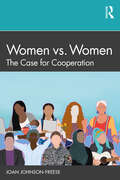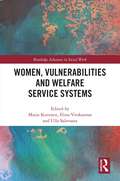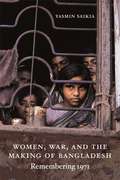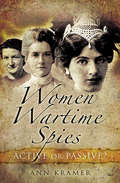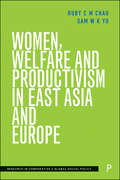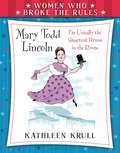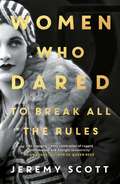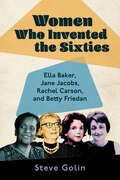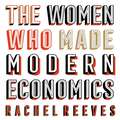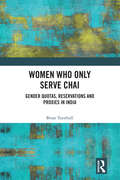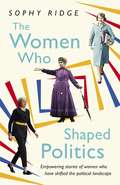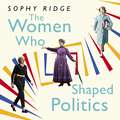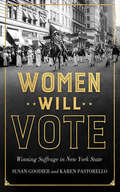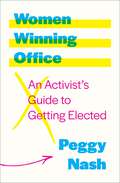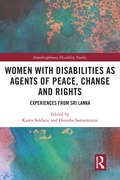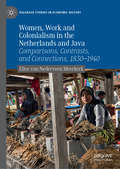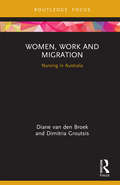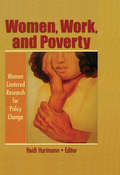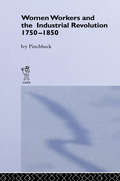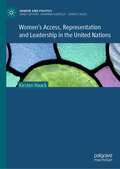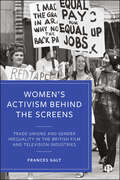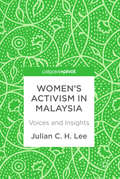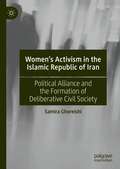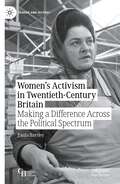- Table View
- List View
Women vs. Women: The Case for Cooperation
by Joan Johnson-FreeseWomen vs. Women is a book about power dynamics and competition between women. The author argues that women have been mired in competitive quicksand since the beginning of time, often beginning in earnest during adolescence, to their social, economic, and political detriment. Exacerbating differences between women has become a strategy for maintaining male-dominated power structures, so – while competition will always exist and can at times be useful – self-inflicted and counterproductively imposed competition between women must end, as it dilutes their power and opportunities. From a security perspective, gender inequality is a destabilizing societal force. This book represents a confluence of ideas. First, the ill effects of gender inequality from the individual to the national and global level (and the fact that this is far from being universally recognized and addressed). Second, the negative influence of extremes, especially political and religious, on society at large and women in particular. Third, the societal stresses imposed on girls and the subsequent lifetime effects. While the challenges of careers, motherhood and old age are all significant for women, the author contends that how they handle these challenges can be shaped by adolescent experiences. As a multidisciplinary work, this book is intended as a supplementary text in undergraduate and graduate courses on American politics, American foreign policy, gender and diversity studies, global studies, sociology, security studies, culture-focused courses, economics and religion. It will also interest general audiences increasingly eager to understand the dynamics of the world they live in.
Women, Vulnerabilities and Welfare Service Systems (Routledge Advances in Social Work)
by Marjo Kuronen Elina Virokannas Ulla SalovaaraThis book studies welfare systems in Europe and beyond from the standpoint of women in vulnerable positions in society. These systems are under major transformations with new models of service delivery and management, austerity measures, requirements for cost-effectiveness, marketization, and the prioritization of services. Divided into three parts: Welfare service systems (not) responding to vulnerable situations of women Women’s encounters with the welfare service system Contradictions of informal support this book considers the experiences and encounters with the service system of women in poverty, homeless women, women with substance use problems, women sentenced of crime, girls and young women in care, and refugees and asylum-seeking women. Drawing upon research and critical discussions from Finland, Canada, Israel, Slovenia, Spain and the UK, this book provides new empirical findings and critical insights, and a valuable resource for the academics and students in social work, social policy, sociology and gender studies, but also for policy makers and professionals in social and health care.
Women, War, and the Making of Bangladesh: Remembering 1971
by Yasmin SaikiaFought between India and what was then East and West Pakistan, the war of 1971 led to the creation of Bangladesh, where it is remembered as the War of Liberation. For India, the war represents a triumphant settling of scores with Pakistan. If the war is acknowledged in Pakistan, it is cast as an act of betrayal by the Bengalis. None of these nationalist histories convey the human cost of the war. Pakistani and Indian soldiers and Bengali militiamen raped and tortured women on a mass scale. In Women, War, and the Making of Bangladesh, survivors tell their stories, revealing the power of speaking that deemed unspeakable. They talk of victimization--of rape, loss of status and citizenship, and the "war babies" born after 1971. The women also speak as agents of change, as social workers, caregivers, and wartime fighters. In the conclusion, men who terrorized women during the war recollect their wartime brutality and their postwar efforts to achieve a sense of humanity. Women, War, and the Making of Bangladesh sheds new light on the relationship among nation, history, and gender in postcolonial South Asia.
Women Wartime Spies: Active or Passive?
by Ann Kramer&“A thrilling, challenging and educational book . . . examines the roles of spies such a Edith Cavell, Mata Hari, Violette Szabo and Noor Inayat Khan&” (Pennant Magazine). Women spies have rarely received the recognition they deserve. They have often been trivialized and, in cinema and popular fiction, stereotyped as vamps or dupes. The reality is very different. As spies, women have played a critical role during wartime, receiving and passing on vital information, frequently at considerable risk. Often able to blend into their background more easily than their male counterparts, women have worked as couriers, transmitters, and with resistance fighters, their achievements often unknown. Many have died. Ann Kramer describes the role of women spies during wartime, with particular reference to the two world wars. She looks at why some women chose to become spies, their motives, and backgrounds. She looks at the experience of women spies during wartime, what training they received, and what skills they needed. She examines the reality of life for a woman spy, operating behind enemy lines, and explores and explodes the myths about women spies that continue until the present day. The focus is mainly on Britain but also takes an international view as appropriate. &“Tells the often surprising stories of some of the women who chose to become spies and to serve their country . . . An excellent work.&” —The Great War Magazine
Women, Welfare and Productivism in East Asia and Europe (Research in Comparative and Global Social Policy)
by Ruby Chau Sam YuDeveloping the new framework of ‘life-mix’, which considers the mixed patterns of caring and working in different periods of life, this book systematically explores the interplay of productivism, women, care and work in East Asia and Europe. The book ranges across four key aspects of welfare — childcare, parental leave, employment support and pensions — to illustrate how policies affect women in various periods of their lives. Policy case studies from France, Germany, Hong Kong, Hungary, South Korea, Sweden and the UK, show how welfare could support people’s caring and working lives. This book forms a prescient examination of how productivist thinking underpins regimes and impacts women’s welfare, care and work in both the East and West.
Women Who Broke the Rules: Mary Todd Lincoln
by Kathleen Krull"Well-behaved women seldom make history." --Laurel Thatcher Ulrich <P><P>Women Who Broke the Rules celebrates the bold and brave women who have forged their own paths--breaking rules along the way--to help shape our country's past, present, and future. Acclaimed author Kathleen Krull blends history and humor in this accessible young biography series. Mary Todd Lincoln had a unique and determined, if sometimes erratic, personality that made her one of the most memorable First Ladies. Although she was born and raised in the South, she staunchly supported her husband's quest to save the Union and she strictly supported his policies. She was also an advocate for our veterans, and she would often bring flowers and food to wounded soldiers in the hospital and even write letters for them to their loved ones. No matter what criticism or personal hardships she faced, including witnessing her husband's assassination, she remained steadfastly loyal to her country. Lexile Measure: 880
Women Who Dared: To Break All the Rules
by Jeremy ScottVictoria Woodhull, Mary Wollstonecraft, Aimee Semple McPherson, Edwina Mountbatten, Margaret Argyll and Chanel were all women who dared. They had no time for what society said they could and couldn&’t do and would see the world bend before they did. In 1872 a mesmerising psychic named Victoria Woodhull shattered tradition by running for the White House. Had she won the ensuing spectacle would surely have rivalled that of our own era. Abhorring such flamboyance, Mary Wollstonecraft inspired a revolution of thought with her pen as she issued women&’s first manifesto – still to be fulfilled. From Aimee Semple McPherson, the first female preacher in America, to Coco Chanel, designer of an empire, these women became the change they wanted to see in society. In Women Who Dared, Jeremy Scott pays tribute to them all with wit, verve and reverence.
Women Who Invented the Sixties: Ella Baker, Jane Jacobs, Rachel Carson, and Betty Friedan
by Steve GolinWhile there were many protests in the 1950s—against racial segregation, economic inequality, urban renewal, McCarthyism, and the nuclear buildup—the movements that took off in the early 1960s were qualitatively different. They were sustained, not momentary; they were national, not just local; they changed public opinion, rather than being ignored. Women Who Invented the Sixties tells the story of how four women helped define the 1960s and made a lasting impression for decades to follow. In 1960, Ella Baker played the key role in the founding of the Student Nonviolent Coordinating Committee, which became an essential organization for students during the civil rights movement and the model for the antiwar and women’s movements. In 1961, Jane Jacobs published The Death and Life of Great American Cities, changing the shape of urban planning irrevocably. In 1962, Rachel Carson published Silent Spring, creating the modern environmental movement. And in 1963, Betty Friedan wrote The Feminine Mystique, which sparked second-wave feminism and created lasting changes for women. Their four separate interventions helped, together, to end the 1950s and invent the 1960s.Women Who Invented the Sixties situates each of these four women in the 1950s—Baker’s early activism with the NAACP and the Southern Christian Leadership Conference, Jacobs’s work with Architectural Forum and her growing involvement in neighborhood protest, Carson’s conservation efforts and publications, and Friedan’s work as a labor journalist and the discrimination she faced—before exploring their contributions to the 1960s and the movements they each helped shape.
The Women Who Made Modern Economics
by Rachel ReevesA powerful call to put the women back into economics and embrace a better future for all.THE WOMEN WHO MADE MODERN ECONOMICS tells the story of the women who for too many years have been locked out of the economy with negative consequences for them and for society as a whole. Economic thinking has also largely ignored what women have to offer, marginalising the work of female economists or simply not recognising their achievements. As a woman and economist who is herself challenging those barriers, Rachel Reeves has written a passionate, powerful and inspiring book dedicated to the women who have gone before and to those who will change the future. Drawing on her personal experiences and relating them to the work of women past and present who are often overlooked, Reeves explores the ideas of theorists such as Harriet Martineau, Mary Paley Marshall and Joan Robinson but also the contributions of policy makers such as Janet Yellen, Gita Gopinath and Christine Lagarde. Throughout, she outlines her vision for the future of the economy if she does become the first female Chancellor of the UK, a future in which productivity is enhanced, growth is sustainable and there are opportunities for all, not just a privileged elite.(P) 2023 Hodder & Stoughton Limited
Women Who Only Serve Chai: Gender Quotas, Reservations and Proxies in India
by Brian TurnbullThis book investigates the experiences of women city councilors in India. It follows the careers of women in Jaipur, Rajasthan, who were brought into public office through a gender quota instituted over two decades ago. It reveals how, even in office, women continue to face stigma and normative restrictions imposed by a society not entirely willing to accept them in a public and independent position; and how men, technically blocked by the gender quota from holding office themselves, continue to exert control and influence over women officeholders, even sidelining them in many cases as proxies. The volume also documents the role of these men, colloquially known as parshad-patis, who have uniquely subverted the gender quota without violating any of the formal quota rules. To combat these challenges, the author presents pragmatic approaches to empower women in political offices at the grassroots and highlights the need for a comprehensive support structure to aid gender quota institutions in delivering equality in highly patriarchal environments. Drawing on extensive fieldwork and interviews with elected members and their spouses, as well as journalists, women’s rights activists, and student political leaders, this book provides fascinating insights into the everyday politics of India. It will be of great interest to scholars and researchers of gender studies, politics, political processes, and South Asian studies.
The Women Who Shaped Politics: Empowering stories of women who have shifted the political landscape
by Sophy RidgeSophy Ridge, presenter for Sky News, has uncovered the extraordinary stories of the women who have shaped British politics. Never has the role of women in the political world ever been more on the news agenda, and Sophy has interviewed current and former politicians including among others, Nicola Sturgeon, Ruth Davidson, Betty Boothroyd gain exclusive insight into the role women play in politics at the highest level. The book also includes Theresa May's first at-length interview about her journey to becoming Prime Minister. These interviews have revealed the shocking truth about the sexism that is rife among the House of Commons both in the past and today, with sometimes shocking, and sometimes amusing anecdotes revealing how women in Westminster have worked to counter the gender bias. Sophy provides gripping insight into historical and contemporary stories which will fascinate not just those interested in politics but those who want to know more about women's vital role in democracy. From royalty to writers and from class warriors to suffragettes, Sophy tells the story of those who put their lives on the line for equal rights, and those who were the first to set foot inside the chambers of power, bringing together stories that you may think you know, and stories that have recently been discovered to reveal the truth about what it is to be a woman in Westminster. Looking at the different ways that women have shaped government allows Sophy to draw parallels across history and celebrate fascinating women you want to know more about.
The Women Who Shaped Politics: Empowering stories of women who have shifted the political landscape
by Sophy RidgeSophy Ridge, presenter for Sky News, has uncovered the extraordinary stories of the women who have shaped British politics. Never has the role of women in the political world ever been more on the news agenda, and Sophy has interviewed current and former politicians including among others, Nicola Sturgeon, Ruth Davidson, Betty Boothroyd gain exclusive insight into the role women play in politics at the highest level. The book also includes Theresa May's first at-length interview about her journey to becoming Prime Minister. These interviews have revealed the shocking truth about the sexism that is rife among the House of Commons both in the past and today, with sometimes shocking, and sometimes amusing anecdotes revealing how women in Westminster have worked to counter the gender bias. Sophy provides gripping insight into historical and contemporary stories which will fascinate not just those interested in politics but those who want to know more about women's vital role in democracy. From royalty to writers and from class warriors to suffragettes, Sophy tells the story of those who put their lives on the line for equal rights, and those who were the first to set foot inside the chambers of power, bringing together stories that you may think you know, and stories that have recently been discovered to reveal the truth about what it is to be a woman in Westminster. This book is a celebration of the differing ways that women have shaped the political landscape. The book also, importantly, sheds light on the challenges faced by women in government today, telling us the ways that women working in politics battle the sexism that confront them on a daily basis.
The Women Who Shaped Politics: Empowering stories of women who have shifted the political landscape
by Sophy RidgeFrom royalty to suffragettes and from campaigners to contemporary rebels, Sky News Presenter Sophy Ridge explains the ways that women have changed the face of politics.Sophy Ridge, presenter for Sky News, has uncovered the extraordinary stories of the women who have shaped British politics. Never has the role of women in the political world ever been more on the news agenda, and Sophy has interviewed current and former MPs to gain exclusive insight into the role women play in politics at the highest level. The book also includes Theresa May's first at-length interview about her journey to becoming Prime Minister.Sophy provides gripping insight into historical and contemporary stories which will fascinate not just those interested in politics but those who want to know more about women's vital role in democracy. From royalty to writers and from class warriors to suffragettes, Sophy tells the story of those who put their lives on the line for equal rights, and those who were the first to set foot inside the chambers of power, bringing together stories that you may think you know, and stories that have recently been discovered. Looking at the different ways that women have shaped government allows her to draw parallels across history and uncover fascinating women you want to know more about.(P)2017 Hodder & Stoughton
Women Will Vote: Winning Suffrage in New York State
by Susan Goodier Karen PastorelloWomen Will Vote celebrates the 2017 centenary of women’s right to full suffrage in New York State. Susan Goodier and Karen Pastorello highlight the activism of rural, urban, African American, Jewish, immigrant, and European American women, as well as male suffragists, both upstate and downstate, that led to the positive outcome of the 1917 referendum. Goodier and Pastorello argue that the popular nature of the women’s suffrage movement in New York State and the resounding success of the referendum at the polls relaunched suffrage as a national issue. If women had failed to gain the vote in New York, Goodier and Pastorello claim, there is good reason to believe that the passage and ratification of the Nineteenth Amendment would have been delayed. Women Will Vote makes clear how actions of New York’s patchwork of suffrage advocates heralded a gigantic political, social, and legal shift in the United States. Readers will discover that although these groups did not always collaborate, by working in their own ways toward the goal of enfranchising women they essentially formed a coalition. Together, they created a diverse social and political movement that did not rely solely on the motivating force of white elites and a leadership based in New York City. Goodier and Pastorello convincingly argue that the agitation and organization that led to New York women’s victory in 1917 changed the course of American history.
Women Winning Office: An Activist’s Guide to Getting Elected
by Peggy NashWhen Peggy Nash first decided to run for elected office, she had no idea where to start, who to contact, or what the rules were. For those who are underrepresented in political life, politics can seem like a secret society designed to shut them out. Women Winning Office is a practical handbook for activist women on how to open doors and take their place in the political process. Find out how to build a team, get nominated, inspire volunteers, and canvass voters. Nash draws on her experience in five federal campaigns, as well as the stories of many inspiring Canadian women who have run for office at all levels of government. Some succeeded; some did not. Some faced difficult and painful experiences. Every one of them would do it again. To make real progressive change, we need to change not only who gets elected in Canada, but how our democracy functions. If you want to find out how to take your desire for a better world into elected office, this book is for you.
Women with Disabilities as Agents of Peace, Change and Rights: Experiences from Sri Lanka (Interdisciplinary Disability Studies)
by Karen Soldatic and Dinesha SamararatneDrawing on rich empirical work emerging from core conflict regions within the island nation of Sri Lanka, this book illustrates the critical role that women with disabilities play in post-armed conflict rebuilding and development. This pathbreaking book shows the critical role that women with disabilities play in post-armed conflict rebuilding and development. Through offering a rare yet important insight into the processes of gendered-disability advocacy activation within the post-conflict environment, it provides a unique counter narrative to the powerful images, symbols and discourses that too frequently perpetuate disabled women’s so-called need for paternalistic forms of care. Rather than being the mere recipients of aid and help, the narratives of women with disabilities reveal the generative praxis of social solidarity and cohesion, progressed via their nascent collective practices of gendered-disability advocacy. It will be of interest to academics and students working in the fields of disability studies, gender studies, post-conflict studies, peace studies and social work.
Women, Work and Colonialism in the Netherlands and Java: Comparisons, Contrasts, and Connections, 1830–1940 (Palgrave Studies in Economic History)
by Elise van Nederveen Meerkerk‘This book makes an important contribution to the history of household labour relations in two contrasting societies. It deserves a wide readership.’—Anne Booth, SOAS University of London, UK ‘By exploring how colonialism affected women’s work in the Dutch Empire this carefully researched book urges us to rethink the momentous implications of colonial exploitation on gender roles both in periphery and metropolis.’ —Ulbe Bosma, the Free University of Amsterdam, the Netherlands ‘In this exciting and original book, Elise van Nederveen Meerkerk exposes how colonial connections helped determine the status and position of women in both the Netherlands and Java. The effects of these connections continue to shape women’s lives in both colony and metropole today.’—Jane Humphries, University of Oxford, UKRecent postcolonial studies have stressed the importance of the mutual influences of colonialism on both colony and metropole. This book studies such colonial entanglements and their effects by focusing on developments in household labour in the Dutch Empire in the period 1830-1940. The changing role of households’, and particularly women’s, economic activities in the Netherlands and Java, one of the most important Dutch colonies, forms an excellent case study to help understand the connections and disparities between colony and metropole.The author contends that colonial entanglements certainly existed, and influenced developments in women’s economic role to an extent, both in Java and the Netherlands. However, during the nineteenth century, more and more distinctions in the visions and policies towards Dutch working class and Javanese peasant households emerged. Accordingly, a more sophisticated framework is needed to explain how and why such connections were – both intentionally and unintentionally – severed over time.
Women, Work and Migration: Nursing in Australia (Routledge Focus on Business and Management)
by Diane van den Broek Dimitria GroutsisThis book looks at the migration and work experiences of six women who have migrated to Australia from China; Zimbabwe; South Korea; the United Kingdom; India and the Philippines. It sets their journeys out into three distinct periods of migration, including the first period of their lives when they reflect on their experiences growing up with their immediate families and the factors that encouraged them to gravitate towards a nursing career. The second period covers time when each of these women begin to think about where their career in nursing might taken them. During this phase, these women take their first steps to leave their home country and migrate to Australia, often after several countries in between. The final section allows the reader to understand how these women initially experienced Australia when they first arrived and how they faced challenges both personally and professionally after arrival in their new place to call home. The discussions within these three sections cover both professional and personal/familial reflections, where differences in nursing identity between sending and destination country is discussed alongside the adjustments that the women needed to make to overcome loneliness and to successfully integrate into new organizational environments. Each chapter analyses migration as a life course, which considers why nurses leave their home country and find a new place to call home. Furthermore, if they find themselves thinking about returning to their country of birth; how or if they maintain transnational links, and how identity and ethnicity shape these responses. These life trajectories are underscored by an historical context setting of nursing migration to Australia in the opening chapter offering unique insights into the changing process of migration, accreditation, registration and settlement of nurses in Australia. The book will be of value to researchers, academics, and students interested in gender studies, career and migration, health and nursing, and international HRM.
Women, Work, and Poverty: Women Centered Research for Policy Change
by Heidi I. HartmannFind out how welfare reform has affected women living at the poverty levelWomen, Work, and Poverty presents the latest information on women living at or below the poverty level and the changes that need to be made in public policy to allow them to rise above their economic hardships. Using a wide range of research methods, including in-depth interviews, focus groups, small-scale surveys, and analysis of personnel records, the book explores different aspects of women&’s poverty since the passage of the 1986 welfare reform bill. Anthropologists, economists, political scientists, sociologists, and social workers examine marriage, divorce, children and child care, employment and work schedules, disabilities, mental health, and education, and look at income support programs, such as welfare and unemployment insurance. Women, Work, and Poverty illuminates the changes in the causes of women&’s poverty following welfare reform in the United States, using up-to-date research that&’s both qualitative and quantitative. Taking racial and ethnic diversity into account, the book&’s contributors examine new findings on the feminization of poverty, the role of children and the lack of child care as an obstacle to employment, labor market policies that can reduce poverty and improve gender wage equality, sex and race segregation in the labor market, and the low quality of jobs available to low income women.Women, Work, and Poverty examines: marriage, motherhood, and work pay equity and living wage reforms community resources welfare status and child care acquiring higher education advancing women of color income security repaying debt after divorce gender differences in spendable income women&’s job lossWomen, Work, and Poverty is an invaluable aid for academics working in social work, social policy, women&’s studies, economics, sociology, and political science, and for policy researchers, anti-poverty activists, and women&’s leaders.
Women Workers in the Industrial Revolution
by Ivy PinchbeckFirst Published in 2004. It is often assumed that the woman worker was produced by the Industrial Revolution, and that since that time women have taken an increasing share in the world's work. This theory is, however, quite unsupported by facts. In every industrial system in the past women have been engaged in productive work and their contribution has been recognised as an indispensable factor. This volume is devoted to women's employment inagriculture and the agrarian revolution.
Women's Access, Representation and Leadership in the United Nations (Gender and Politics)
by Kirsten HaackThe face of international politics has changed significantly in the 21st century: it has become increasingly female. Whether that includes women in multilateral meetings, global conferences and embassies, or women at the UN and one of its many agencies in the field, it is apparent that women are accessing leadership positions in a variety of areas. This book investigates the development of gender equality at the United Nations by analyzing women in leadership roles. This introduction of empirical feminism to the study of international organizations applies what is known about women’s participation and representation in comparative politics and gender studies to the United Nations System. It traces women’s access to leadership roles, and explains where and why a range of hurdles prevent women from participating in the work of the UN. In doing so, it offers insights into recruitment and human resources practices and their politics, and into leadership by bureaucratic actors.
Women’s Activism Behind the Screens: Trade Unions and Gender Inequality in the British Film and Television Industries
by Frances GaltFrances C. Galt explores the role of trade unions and women’s activism in the British film and television industries in this important contribution to debates around gender inequality. The book traces the influence of the union for technicians and other behind-the-camera workers and examines the relationship between gender and class in the labour movement. Drawing on previously unseen archival material and oral history interviews with activists, it casts new light on women’s experiences of union participation and feminism over nine decades. As concerns about the gender pay gap, women’s rights and harassment continue, it assesses historical progress and points the way to further change in film and TV.
Women’s Activism in Malaysia: Voices And Insights
by Julian C. LeeIn this book, the author draws on over a decade of first-hand experience as an academic-activist and on interviews with women in Malaysia’s women’s rights movement. Despite a considerable array of challenges to their participation in the public and political spheres, the movement is especially vibrant. Presenting insights from feminist activists in Malaysia, the book explores the Women’s Candidacy Initiative’s efforts to promote independent women in Parliament; the work of women’s coalition the Joint Action Group for Gender Equality; how activists understand and experience the concept of feminism; and finally the place of men in feminism. Women’s Activism in Malaysia will be of interest to students and scholars across a range of disciplines including gender studies, politics and sociology.
Women’s Activism in the Islamic Republic of Iran: Political Alliance and the Formation of Deliberative Civil Society
by Samira GhoreishiThrough an intersectional feminist re-reading of the Habermasian theoretical framework, this book analyses how women's activism has developed and operated in the Islamic Republic of Iran. Chapters look at three key areas of women's activism in Iran: how women deliberately engaged with media activism despite the government's controlling and repressive policies; women's involvement in civil society organisations, institutions and communities, and cooperation through multilevel activism; and women's activism in the political sphere and its connection with media and civil society activism despite the theocratic system. Drawing upon interviews, analyses of journal and newspaper articles and documentary/non-documentary films, as well as personal experiences, observations and communications, the book examines to what extent Iranian women's rights' groups and activists have collaborated not only with each other but with other social groups and activists to help facilitate the formation of a pluralist civil society capable of engaging in deliberative processes of democratic reform.This book will be of interest to scholars in Gender Studies and Middle Eastern Studies, particularly those who study women's and other social movements in Iran.
Women’s Activism in Twentieth-Century Britain: Making a Difference Across the Political Spectrum (Gender and History)
by Paula BartleyThis book serves as an introduction to the extraordinary diversity of women’s activism. Paula Bartley's original research is supported by a range of writing to provide a powerful impression of the actions taken by groups of women from across the social and political spectrum, making the book invaluable to both students and interested readers. These women set out to make a difference to their locality, their country and sometimes the world. The story of women’s activism embodies stimulating accounts of progress and reversals, of commitment and uncertainty, of competing rights and challenging wrongs. The story of women’s activism is not tidy or well-ordered. It is messy and unorthodox. And full of surprises.
